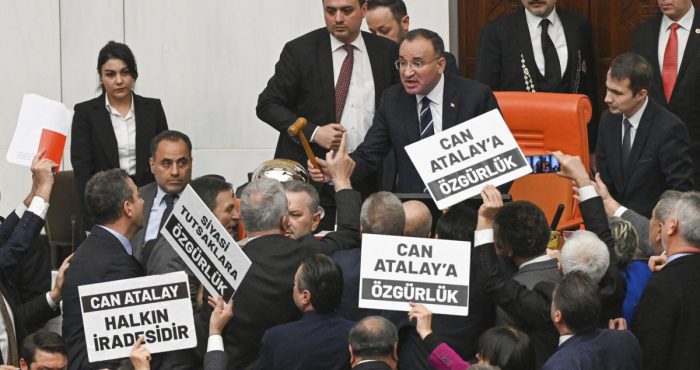I would like to state that I support the recent declaration of thought on welfare allowance made by Judge Uğur Gençkkan distinguishing himself as a sincere lawyer. I would invite him to further develop his ideas thereon, and to produce or contribute to the compilation of a book offering a radical solution in terms of philosophical, sociological, psychological and individual aspects to the alimony injustice caused by very common unjustified court judgments on alimony. The purpose of this is to teach “justice” and guide law makers and enforcers along the correct path therewith.
The family is the smallest nucleus of society wherein solidarity, cooperation and sharing are natural requirements for all kinds of material and moral issues. The instinct and desire to sustain the generations of spouses makes it necessary to maintain solidarity and sharing within the family as well. The state makes this a necessity by law. Therefore, by intervening in the separation process of spouses, it forcefully ensures that solidarity, which was previously voluntarily achieved, is maintained. The judicial power of the government implicitly regulates the performance of this solidarity obligation after the separation of couples and accordingly decides, through maintenance orders of courts, which side will provide financial assistance to whom, which amount for which reason and until which time. It enforces such maintenance orders at the point of the bayonet if needed. Decisions and orders of the judiciary which are neither compassionate nor sympathetic, nor often the right decision is in most circumstances enforced vigorously with a lack of proficiency and, if and when required, with a heavy hand. Couples separating further lose respect for one another, and as a result, happy affairs turn into passionate hostilities, and the process of separation becomes a greater struggle.
This devastating process of separation causes much harm to women, who not only are often in financially weak positions, but are also restricted in terms of freedoms due to social taboos and peer pressure. It is an unequivocal fact that women are adversely impacted by alimony issues. Women in Turkey who divorce at 40 to 45 years of age with several children are on the one hand sinking into despair and a sense of isolation, and on the other side are overwhelmed by the responsibility of raising their children in an appropriate manner. Ultimately, they find themselves almost defeated by losing the financial support of their husbands who act unfaithfully and irresponsibly.
Maintenance orders are generally wrong…
Government intervention aims to ensure that couples maintain their social and economic welfare status achieved whilst married, after their separation. It has almost become a general rule for the man to give support to the woman by paying a welfare allowance. On the other hand, some men who believe it is unfair for them to pay a welfare allowance to their ex-wives, and who the judiciary find hard to locate, use many different methods to avoid paying or to pay as low an allowance as possible. Since most of the time it is not possible to establish their actual financial status and assets, maintenance orders are generally inaccurate, hence, the economic and social status available before separation cannot be maintained for either side. The fact that the defence can get away with lying in court prevents the courts from revealing the truth and from giving accurate maintenance orders. Husbands living a luxurious life up until the hearing try to appear as if they are struggling to make ends meet. The judge orders a welfare allowance based on the results of an investigation performed by security forces and at their own discretion (i.e. according to their own circumstances). Most of the time the reality is not reflected by the maintenance orders of courts. Of course, the men are also victimised, damaged and mistreated by maintenance orders. Especially in marriages that only last a short while, maintenance orders given in favour of the women for an indefinite time are standing as an injustice to the men. Even when couples go through the motions of marriage and after a short period separate, a maintenance order may be issued in favour of the woman. In order for the man to get rid of this obligation of welfare allowance, either the man must die, or the woman must remarry or find a paid job and start work. As a result, women who have a profession, but nevertheless do not work at all, or who can indeed become skilled in a profession, but do not intend to learn, or who can indeed work, but prefer not to work, or who in fact earn a living, but whose income is not reflected in the official records, or who are actually married, but do not enter into an official marriage contract, continue to collect and live on welfare allowances from their ex-husbands after a marriage of only a few months. The man thus may be obliged to pay a welfare allowance sequentially for his entire life because of a short-term arrangement which terminated due to marital conflicts. This is why there are non-governmental organisations that bring together men who are victims of such circumstances.
The alimony question is dissuading people from marrying…
A Swiss accountant who I spoke with many years ago complained to me that his ex-wife does not work though she has a good profession, and for this reason, half of his own wage is directly transferred to his ex-wife’s bank account. In his words, his anger at his ex-wife and his sense of injustice were clear. What I mean to say is that this question is a real social problem not only in Turkey, but also in Switzerland, one of the most developed countries in the world.
This primitive and unfair approach based upon the assumption that the woman is handed over from the father to the husband in terms of responsibility – as if she is a property or a slave – is indeed turning the woman into a property, a slave or a second-class human. Mothers and fathers intending to give away their daughter, an inseparable part of them, to a husband, preferably a good egg, are drumming into their daughter since childhood the belief of being doomed and in need of a man. A woman raised with this concept naturally feels like that and chooses such a way of life. Even poor women in Turkey are bearing a lot of spousal abuse, domestic violence and even crimes which could easily raise hell had be referred to the courts. On the other hand, the right to take a share from the income of the ex-husband may induce laziness in some women who have a profession, and can be productive, and may lead the men to have prejudices about women and be suspicious about the sincerity of their love.
At the end, a badly arranged law on post-separation alimony is disinclining individuals from marriage, or to put it in other words, is causing a clash in the concept of family, which is the smallest nucleus of society.
For the sake of saving marriage, we need to find an answer to this alimony issue.




